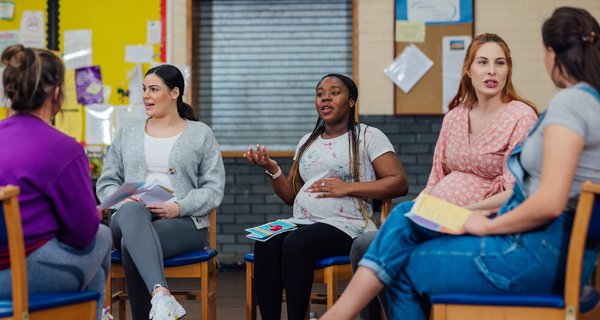We collected feedback via a survey (sent out on 3 April, and closed on 15 April) and diary study (data collected throughout the pilot) from parents and caregivers on how they found the programme, the value of the experience and the impact of the programme on their parenting behaviours and interactions with their children. Parents and caregivers also suggested ways the programme could be improved in future iterations.
1. Overall, respondents to our survey found the text messaging programme useful and engaging
Towards the end of the pilot, we sent a survey to all parents who signed up for the programme (n = 1,763) and 186 parents responded. Around 70% of participating parents reported that the texts were useful/very useful to them.
In comparison to other forms of parenting support (eg, support from family/friends, professionals, parenting apps), almost half of respondents found the programme to be just as useful as other forms of support (score of three), with nearly a third finding it more useful than other forms of support they’ve used.
Parents who responded to the survey (sent out on 3 April, and closed on 15 April) reported high engagement with the service. 97% of respondents reported that they engaged with the content (reading texts and conducting the activity) one or more times per week, with 41% reporting that they engaged a few or multiple times per week.
In other positive signals of the programme’s value, the majority of respondents (74.7%) said that they were likely or very likely to recommend the programme to a friend.
Survey responses to the Tiny Happy People pilot
One of the respondents to our survey commented:
“I think its USP is the simplicity compared with other resources … Any more information on the text could be overwhelming, and there is so much judgement and guilt that this is so needed … of course some people might want an app, but I think the format is key to its success. You could have different level options for how complex you want the ideas to be eg, ideas where you need to buy products or set up an activity.”
– Survey respondent 1
2. We have some early signals that the text messages may be leading parents to increase positive parenting behaviours
Encouragingly, a majority of parents reported that they are implementing at least one key parenting behaviour more frequently since receiving text messages as part of the programme.
Horizontal bar chart showing increased parenting practices, with 62.4% of respondents reported more often describing what conversations they have with their child
While it is important to note that these answers are subjective and subject to social desirability bias, it is encouraging that parents are recognising the key messages of the programme and reporting increased implementation. This is a positive early signal for us that the text messaging programme can have a positive impact on the home learning environment and children’s outcomes.
3. We received positive feedback on the value of the programme to give parents practical advice on how best to interact with their child
Our diary study (n = 31), which we ran alongside the pilot, also showed us that most parents who completed diaries were highly engaged with the programme, found it simple and accessible, and the tips valuable to engage their child.
The following quotes are key insights from our diary study and survey respondents.
Quotes from diary studies and survey responses
A commonly highlighted positive aspect of the programme was how simple and easy the tips and videos were to follow, and how naturally “they fit into everyday routines” (eg, while cooking or doing laundry). Parents liked that the activities didn’t feel overwhelming and didn’t require special materials.
“The text was accessible, and the short videos linked were actually short. If anything takes too long to watch, I’ll never get around to it!”
Diary study participant 3
Some parents also noted that their children seemed more engaged in their interactions than usual.
“When usually doing the creative storytelling, it involves me doing most of the legwork. The use of props for some reason allowed my child to engage and input more.”
Diary study participant 4
4. We also got useful feedback on how the programme could be improved
Some parents did say that the content could be more useful and novel, and requested additional content on topics such as:
- developing children’s fine motor skills and problem-solving activities
- more interactions with family and friends
- more ‘mealtime’ activities
- play ideas with older siblings
- more about helping mums and what they need.
Quotes from diary studies and survey responses
There are a range of ways we can further improve the programme which we will explore in the next phase:
- Including content for a wider age range of children: expanding the current offer to include babies younger than six months old and/or children older than age two. 23% of survey respondents suggested that having the programme in pregnancy would be useful, others asked for advice on ways to include older siblings, and some suggested that they would like to receive the programme until their child started school.
- Broadening language options: having the programme and subtitles on videos available in Welsh, French, Chinese, and other European languages were the most popular requests.
- Improving the text messages themselves: some parents wanted more tips, songs, or structured guidance to help deepen or vary the experience, such as more explanation on the learning benefits of activities.
- More transparent communication: having text messages come from a known sender number to appear more credible/recognisable to users.
Bar charts showing desired features for better engagement







